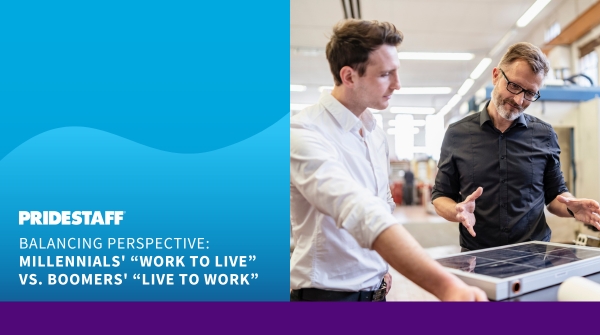Balancing Perspective : Millennials’ ‘Work to Live’ vs. Baby Boomers’ ‘Live to Work’

Today’s diverse workplaces include a mix of generations, each with a unique set of values and attitudes.
Millennials and Baby Boomers stand out. With their opposite approach towards work-life balance, Millennials and Boomers can clash in the workplace, leaving many employers to wonder: Can the needs of both generations be met simultaneously?
Millennials’ ‘Work to Live’ Approach
Millennials, born between 1981 and 1996, are reshaping the modern workplace with their sizeable presence and innovative ways. As digital natives, they’re tech-savvy, DEI-aware, and values-driven, often using their digital prowess to bring about change.
Central to their ethos is the concept of work-life balance. Millennials yearn for careers that offer flexibility, options for remote work, and adequate time off to pursue personal interests and hobbies. They champion a ‘Work to Live’ approach, where work, while necessary, is a means to support their desired lifestyle, personal well-being, and mental health. This perspective has prompted corporates to rethink their normative structures, leading to more inclusive, diverse, and flexible workplaces.
Baby Boomers’ ‘Live to Work’ Approach
On the other end of the spectrum are the Baby Boomers, born between 1946 and 1964. As a generation, they’ve been instrumental in creating a high-paced, highly productive work culture. Characteristics like competitiveness, resourcefulness, and unwavering focus on career success define their relationship with work.
For the Boomers, ‘Living to Work’ was more than just a philosophy; it was a way of life. This generation is known for dedicating long hours and working relentlessly towards career success and financial stability. Since there were limited opportunities for flexibility and remote work during most of their careers, work-life balance is a new—and sometimes uncomfortable—concept for them.
Finding Balance: Learning from Both Generations
Learning and merging the strengths of both generations can pave the way for a more balanced work approach.
On one hand, Millennials’ insistence on flexibility and well-being teaches us that work must be balanced with personal life and interests. Adopting this perspective encourages mental health, creativity, and overall satisfaction in workplace well-being.
On the other hand, Baby Boomers’ tireless dedication and strong work ethic remind us of the necessity of commitment, passion, and perseverance in overcoming challenges to achieve success.
Merging these two perspectives can create an environment where work is an essential, meaningful part of life yet doesn’t wholly define it. Employers who successfully strike a balance between the Millennials’ and Boomers’ disparate perspectives on work will create a workplace where all will thrive.
PrideStaff takes the guesswork out of the recruiting process. We deliver diverse, hardworking talent aligned with your organization’s values and ready to perform. Contact your local PrideStaff office to learn more.
Related Posts



